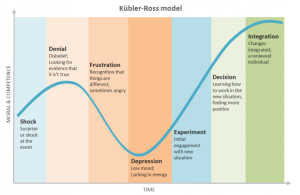Karen Idesoh, one of our Careers Consultants, has written a great post about the strategies you can use to stay motivated. It can be overwhelming when you’re starting a new job or looking for a new so take a deep breath and remember that you’ve got this!
Resilience comes from the Latin word “resilio” which means to bounce back. Resilience is our ability to bounce back from adversity, or in other words our ability to survive and thrive in periods of difficulty or transition.
Whether you have a job offer or are looking for your first graduate job you are now entering a period of transition, from student to job seeker or new employee. Change (whether good or bad) can bring with it a sense of discomfort. This blog is to help you assess your approach to change, how resilient you feel and and build your ability to cope with any bumps in the road.
If you already have a job offer or have even started a new role you might be dealing with imposter syndrome: am I good enough? How do I fit in? What if I make a mistake? Is this really the career for me?
If you are just now starting to focus on your job search you might be thinking: what do I actually want to do? Where do I begin with job search? Will I be able to get the job I really want?
Either way – it’s helpful to acknowledge that transition can be an emotional time and then to take steps to make sure you have the skills and coping mechanisms to see you through.
I want to introduce you to the Change Curve – initially developed by Elisabeth Kubler – Ross to explain the stages of grief but is also recognised a useful tool for thinking about any kind of major life change. Do any of the following statements/stages feel familiar to you just now?
Stage 1 : Shock/Surprise
Shock and surprise to the situation – WOW! I got the job. I’m so happy! Feels a bit unreal. OR Blimey I can’t believe I got a 2.1! I have no idea what to do I now?
Stage 2 : Denial
Where you can’t believe the situation and go into denial. For example, getting the job – I’m sure working won’t be that different from being a student OR I’ll just stick with my part time job for now and think about job search later.
Stage 3 : Strong Feelings/Frustration
OMG Perhaps I have got myself in over my head I’m not sure I can do this! OR I feel stuck in my part time role. I want to do more than this!
Stage 4 : Depression
Reality of the situation bites. For example; I’ll make a fool of myself and be the worst new graduate that has ever worked for this firm. OR I’ll never get a graduate job and I’ll be stuck as a delivery driver for the rest of my life.
Stage 5 : Experiments
The depression of stage 4 motivates you to start to make changes/try out new approaches. For example, perhaps I could speak with some friends who have already started work and get their tips on how to approach the first month of my new job OR who can help me plan how to job search and get my CV in shape? (Insider tip: the KCL Career and Employability Team offer new graduates career support completely free of charge up to 2 years from graduation).
Stage 6 : Decisions
Accepting the Challenge of Change and starting to look for the positives. For example; I think I am starting to understand what is expected of me in this role and I will volunteer to help with the new project even though I’m nervous about doing so OR I’ve spent enough time worrying, it’s time to take some positive action.
Stage 7 : Integration
Adjusting to (and even enjoying) your new normal. For example, I enjoyed my new project work and think I made some useful contributions OR my job search is becoming more effective, I have seen two new jobs I want to apply to, and I have an interview next week which I feel confident about.
If any of these statements or situations resonate with you it gives you an idea of where you are at in your personal change curve. So how do you move forward?
Let’s get specific with an exercise designed to help you identify what coping behaviours and strategies you may already be using.
Think of a time in the past when you have had a big change/or difficult time. Then think about how you coped used by breaking it down into 3 headers. Write examples under each header.
Strengths:
Were there any personal strengths or personal qualities that helped you cope such as a sense of humour, such as using your creativity to problem solve, being open-mindedness or hard-working? What strengths do you think you have?
Strategies:
Were there any specific things you did/steps you took that helped, such as exercising regularly to relieve stress, such as cuddling up with a pet, practising mindfulness, writing your thoughts in a journal, or talking it through with someone else?
Insights
Were there any ideas or sayings that you found particularly useful? For example, a quote from an author or from a favourite song?
Now, look at your list, is there anything you are already utilising as part of this new transition? If so well done, you are already building your resilience based on past experience.
If you are short of ideas about what might help, ask friends and family what helps them in difficult times. Do you think any of their strategies work for you? If yes, then go ahead and implement these coping mechanisms in your situation. If you are not sure why not experiment to see works for you?
I’m writing this at the end of my workday so before I go to take my hot bath let me leave you with a quote that resonate with me:
“Do not judge me by my success, judge me by how many times I fell down and got back up again.”
Nelson Mandela

